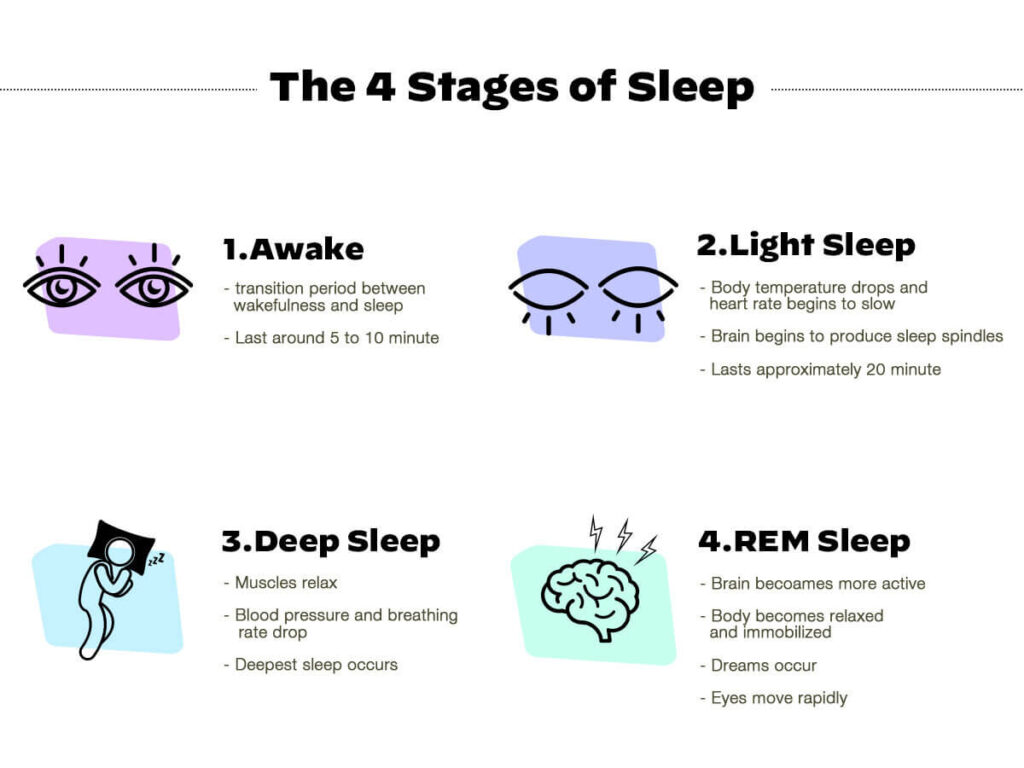Sleep and metabolic health are deeply intertwined together. To understand how the different sleep stages affect your metabolic health, we must first understand the two important concepts – Metabolism and the Architecture of Sleep.
Highlights
- The architecture of sleep is characterized by Deep Sleep (Non-Rapid Eye Movement or NREM) and REM Sleep (Rapid Eye Movement),
- The body goes into states of rest and relaxation during this time and this in turn acts as a natural blood pressure medication,
- Going to bed at the same time each night and getting up at the same time each morning, including on the weekends.
What is Metabolism?
Metabolism consists of a wide range of biochemical processes that occur within a living organism. It primarily constitutes the two processes of anabolism (build up) and catabolism (break down).
What is the Architecture of Sleep?
The architecture of sleep is characterized by Deep Sleep (Non-Rapid Eye Movement or NREM) and REM Sleep (Rapid Eye Movement). During different stages of sleep, different metabolic processes of the body occur for growth, repair, restoration, and maintenance.
When you fall asleep, you enter the light stages of Deep Sleep (Stage I and Stage II) where the brain and heart slow down. After 20 mins of falling asleep, one tends to fall into the deeper stages of Deep Sleep (Stage III and Stage IV). After about 70 minutes, we go into REM Sleep.
Each cycle of sleep (Deep + REM) lasts about 90 minutes. The first half of the night is predominantly NREM, and the second half is predominantly REM sleep.

Metabolic Processes occurring in NREM Sleep
- The body goes into states of rest and relaxation during this time and this in turn acts like a natural blood pressure medication.
- The later stages of NREM sleep are where the body’s glucose utilization is least active. The lower metabolic rate and brain temperature occurring during non-REM sleep seem to provide an opportunity to repair wear and tear done during awake and metabolically active periods.
- Growth Hormone (GH) levels are the highest during the latter stages of NREM Sleep. GH is renowned to have an anti-insulin-like effect contributing to the fall of glucose utilization in the brain.
Metabolic Processes occurring in REM sleep
- It is dictated by the release of Hormones in the body such as Testosterone.
- Cortisol levels are greatly increased during REM Sleep.
- As REM sleep is primarily associated with the state of dreaming, the brain reduces muscle tone in the body, allowing us to dream safely.
- There is an increased glucose utilization in REM sleep which aids our ability to dream, making us Insulin Sensitive.
- These functions of REM Sleep are directly related to the ability to maintain and promote the growth and repair of Muscle Tissue.
- High amounts of REM sleep are highly correlated with longevity.
What happens when you sleep late?
If one sleeps late, they are likely to skip Deep Sleep and go into REM Sleep. The body will get some deep sleep, but it will not last as long as it would, should you get a full night’s rest.
The longer one is awake, the more the increasing need for Deep Sleep. This could lead to autonomic dysfunctions (Increased blood pressure, increased heart rate, change in metabolism, production, and balance of fluids, etc) the next day.
The body’s ability to regulate Blood Glucose through Insulin is primarily dictated by the quantity and quality of NREM Sleep.
Building Good Sleep Habits
According to the Centers for Disease Control and Prevention, good sleep habits, sometimes also known as sleep hygiene, can help you get sufficient sleep, both in terms of quantity and quality. Some habits that can improve your sleep health:
- Consistency: Going to bed at the same time each night and getting up at the same time each morning, including on the weekends
- Bedroom environment: Keeping your bedroom quiet, dark, relaxing, and at a comfortable temperature
- Electronic devices: Removing any electronic devices, such as TVs, computers, and smartphones, from the bedroom
- Food: Avoiding large meals, coffee or caffeinated beverages, and alcohol before bedtime
- Exercise: Getting some exercise. Being physically active during the day can help you fall asleep more easily at night.
Conclusion
Achieving optimal duration and quality of sleep and spending adequate time in the different sleep stages has a large, long-term impact on metabolic health.
By optimising one’s lifestyle to prioritise sleep one can improve mental and physical recovery, longevity, and wellness.
Disclaimer: The contents of this article are for general information and educational purposes only. It neither provides any medical advice nor intends to substitute professional medical opinion on the treatment, diagnosis, prevention or alleviation of any disease, disorder or disability. Always consult with your doctor or qualified healthcare professional about your health condition and/or concerns and before undertaking a new health care regimen including making any dietary or lifestyle changes.
References








